The UK’s electrical waste recycling system is undergoing a major transformation. For years, traditional retailers bore the financial responsibility of recycling discarded electronics, while online platforms like Amazon and eBay avoided similar obligations.
Now, new government reforms ensure that digital giants will finally contribute their fair share to managing electrical waste recycling in the UK a move that promises greater environmental accountability and fairness across the retail sector.
What Triggered the Changes in Electrical Waste Recycling Regulations in the UK?
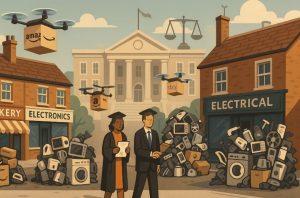
The United Kingdom has long grappled with the challenges of electrical waste, also known as e-waste. However, until recently, the burden of recycling and responsibly disposing of discarded electronics fell disproportionately on traditional brick-and-mortar retailers.
These businesses were required to contribute to recycling schemes under the Waste Electrical and Electronic Equipment (WEEE) regulations, while online giants particularly international platforms largely escaped the same scrutiny.
This imbalance sparked major concern across the retail industry and the environmental sector. A call for reform was echoed by local businesses and campaigners, urging the government to hold online marketplaces equally accountable for the rising tide of e-waste.
How Have Online Marketplaces Avoided Responsibilities Until Now?
Online platforms such as Amazon, eBay, and others have often operated as intermediaries, claiming they are not the “producer” or “retailer” under existing definitions within the WEEE directive. This legal grey area allowed them to facilitate massive volumes of electronic sales without contributing financially to recycling infrastructure.
Because many third-party sellers ship products directly to consumers from outside the UK, they bypassed traditional compliance routes. The result? UK-based retailers were footing the bill for the recycling of products they didn’t sell, creating an unsustainable and unfair system.
How Are Online Platforms Like Amazon and Ebay Now Held Accountable?
In a landmark shift announced by the UK Government in August 2024, large online platforms are now required to register as producers of electrical equipment. This means they must contribute to the cost of collecting and treating waste electrical goods under the producer responsibility scheme.
This reform brings platforms under the same obligations as traditional retailers. They must finance the collection and recycling of items such as phones, laptops, household appliances, and more, sold through their services regardless of who the third-party seller is.
What Role Does the Environment Agency Play in Enforcing Compliance?
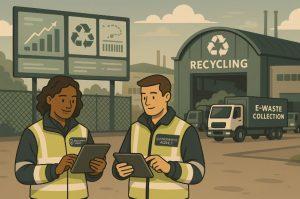
The Environment Agency in England, along with devolved counterparts in Scotland, Wales, and Northern Ireland, is the primary enforcement body. These agencies will oversee the registration of online platforms as producers and ensure they meet all compliance obligations.
They are also responsible for investigating breaches and issuing penalties where companies attempt to circumvent the new rules. With increased data-sharing and improved digital traceability, enforcement is expected to become more robust than ever before.
Why is This Change Important for Uk Consumers and Small Businesses?
The change represents a win for both consumers and local businesses. UK shoppers can now be confident that all sellers, regardless of where they’re based, are contributing to environmental sustainability.
For small and medium-sized businesses operating responsibly within the UK, this levels the playing field. They no longer carry a disproportionate burden in funding e-waste management systems. Consumers, too, benefit from a better-funded and more efficient recycling infrastructure, ultimately making it easier and more accessible to recycle unwanted electricals.
What Are the Expected Benefits for Local Recycling Systems?
The reforms are expected to drive significant investment into the UK’s recycling infrastructure. With online marketplaces contributing to recycling costs, more resources can be allocated to:
Collection Facilities Expansion
Local councils and private recyclers will be able to establish more drop-off points and collection centres, particularly in under-served urban and rural areas.
Improved Processing Technologies
Funds can support the adoption of advanced sorting, shredding, and recovery systems that reduce landfill use and improve recycling yields.
Public Awareness Campaigns
With better financing, national campaigns can educate consumers on how and where to dispose of electronics safely.
What is the WEEE Directive?
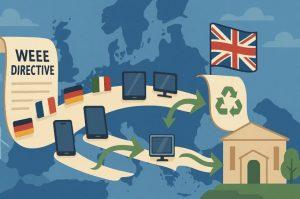
The WEEE directive (Waste Electrical and Electronic Equipment) is a piece of European legislation designed to reduce the environmental impact of discarded electronics. Although the UK has left the EU, it retained and adapted the directive post-Brexit.
The recent reforms are a continuation of the WEEE directive’s principles extending the “polluter pays” model to digital platforms. These platforms now have to play their part in closing the loop from product sale to end-of-life disposal.
How Does the UK’s Weee Compliance Compare Globally?
When compared to other countries, the UK has been a leader in formalising e-waste policy. However, countries like Germany and Sweden had already implemented stricter producer obligations that covered online sellers.
With this reform, the UK catches up and arguably surpasses many nations in holding digital platforms accountable. This approach may become a reference point for other countries seeking to modernise e-waste legislation in the age of e-commerce.
How Will the New Rules Impact Online Sellers and Marketplaces?
Online marketplaces are now expected to take financial and logistical responsibility for recycling any electrical goods sold through their platforms. This includes products from overseas vendors.
Are Smaller Sellers on Digital Platforms Affected Too?
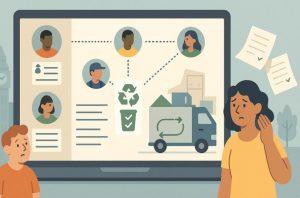
Yes, but indirectly. While the responsibility for compliance falls on the platform itself (such as Amazon or eBay), these platforms may change their seller requirements to ensure traceability. This could involve requiring sellers to register with UK compliance schemes or contribute to recycling funds.
Small vendors should stay informed about platform updates and be prepared for new documentation or recycling obligations being added to seller agreements.
What Steps Should Businesses Take to Meet the New Recycling Obligations?
Retailers and producers including online marketplaces need to:
Register with Producer Compliance Schemes (PCS)
This ensures they meet national obligations and contribute to recycling costs.
Track and Report Electrical Sales Volumes
Accurate data is key to determining each business’s recycling responsibilities.
Educate Sellers and Consumers
Providing clear recycling information at the point of sale helps consumers understand their options and responsibilities.
Is there financial support or guidance available for compliance?
Yes. The government, alongside the Environment Agency, offers detailed guidance through its WEEE regulations pages. Producer compliance schemes also provide support, including:
| Support Type | Offered By | Description |
| Compliance Advice | Environment Agency | Guides businesses through legal requirements |
| Scheme Registration | Approved PCS (e.g. Valpak) | Helps register and manage financial contributions to recycling |
| Data Management Tools | Third-party Consultants | Software and advisory services to ensure correct tracking/reporting |
| Training & Resources | Trade Associations | Help educate sellers on regulations and best practices |
What Are the Broader Implications for Electrical Waste Management in the UK?
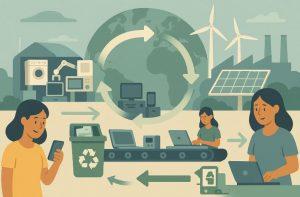
This is more than just regulatory housekeeping. it signals a broader shift in how the UK handles environmental responsibility in the digital economy.
Drives Innovation
Increased contributions from online platforms could fund technological innovation in recycling methods.
Sets Precedent for Other Waste Streams
The model may be extended to packaging, batteries, or textiles wherever e-commerce has created loopholes.
Encourages International Cooperation
As online sales are global, this move may trigger reciprocal reforms in other countries, promoting shared standards and responsibility.
Could This Model Influence Future Environmental Regulations?
Setting a new standard for digital compliance
The UK’s reform highlights that digital platforms can and should be integrated into environmental legislation. By mandating that online marketplaces contribute to the recycling system, the UK is establishing a precedent that aligns the digital economy with sustainability goals.
Inspiration for international environmental policy
This updated model could influence countries worldwide to reassess their own recycling frameworks. Governments across Europe, North America, and Asia may adopt similar policies to close loopholes in e-commerce regulations, ensuring that environmental responsibilities are shared by all sellers physical or digital.
How Can Consumers Play a Role in Supporting Responsible Recycling?
Empowering eco-conscious purchasing decisions
Consumers are key players in shaping the future of recycling. By choosing platforms and sellers that adhere to WEEE regulations, they help reinforce sustainable retail practices. Supporting brands with clear take-back and recycling programs amplifies the demand for responsible business models.
Encouraging proper disposal behaviour
Proper disposal of electrical waste begins with awareness. Consumers should actively seek council-run recycling points, use retailer take-back options when replacing appliances, and avoid sending electronics to landfill via general waste. Even small behavioural changes contribute to long-term environmental improvement.
What Options Are Available for Safe Disposal of Electronic Goods?
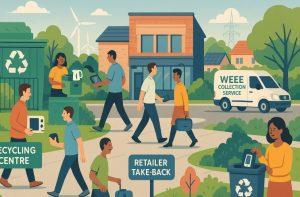
Council and retailer-led recycling options
UK residents have access to multiple electrical waste disposal channels. Local councils operate Household Waste Recycling Centres (HWRCs), many of which include WEEE drop-off areas. Retailers also offer in-store recycling services, often free of charge when replacing an old item with a new one.
The future role of digital platforms in disposal
As regulations evolve, online marketplaces are expected to take a more active role in end-of-life electronics management. From providing clearer recycling instructions at checkout to offering returns or referrals to approved disposal services, digital platforms will become more involved in closing the recycling loop.
Conclusion
This latest reform places the UK at the forefront of e-waste legislation in the digital age. By holding online marketplaces accountable, the government is correcting an imbalance and ensuring all sellers contribute to a cleaner, more sustainable future.
Resource:
FAQs About Electrical Waste Recycling and Online Retailers in the UK
What does WEEE stand for and why is it important?
WEEE stands for Waste Electrical and Electronic Equipment. It ensures producers take responsibility for the lifecycle of electronic goods, especially their disposal and recycling.
Are individual online sellers responsible for WEEE compliance?
Not directly. The platform (e.g., Amazon, eBay) carries the compliance responsibility, though individual sellers may need to meet additional documentation or requirements.
How will this change improve recycling in local UK communities?
With online platforms contributing, local authorities and recycling firms gain more funding to improve services, expand facilities, and increase public engagement.
Can consumers be fined for improper disposal of e-waste?
While rare, some councils can fine for illegal dumping or contamination. However, most focus on education and accessible disposal options.
Are mobile phones included in WEEE regulations?
Yes, all electronic devices with a plug or battery, including phones, laptops, and tablets, fall under WEEE compliance.
What should businesses do to stay updated with WEEE changes?
They should register with a Producer Compliance Scheme, subscribe to updates from the Environment Agency, and consult trade associations.
Will prices increase due to new compliance costs for platforms?
It’s possible that platforms may adjust fees or pass on some costs to sellers, but the long-term benefits of improved recycling and fairness outweigh the impact.








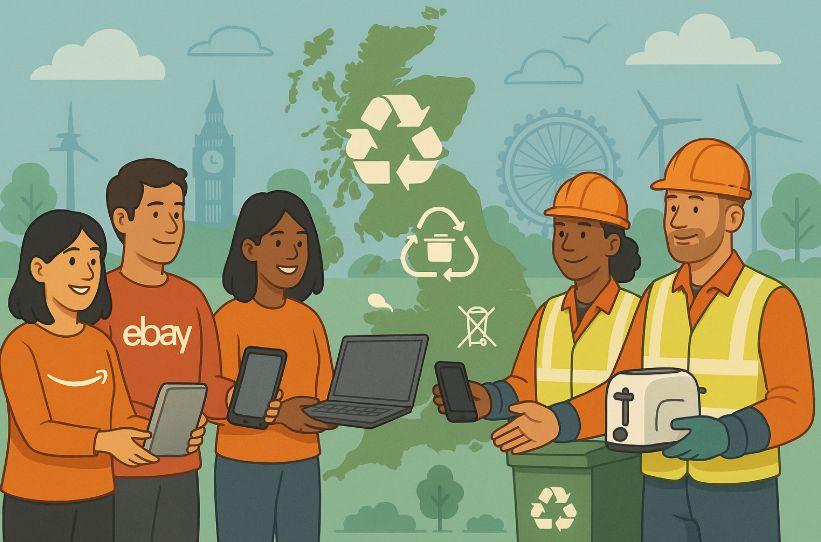
Leave feedback about this